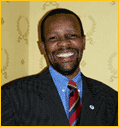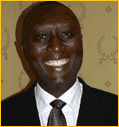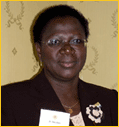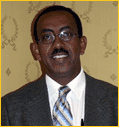|
AfMA was established in 2004 and currently involves the following
countries:
Angola, Botswana, Cameroon, Ethiopia, Ghana, Kenya, Lesotho,
Mozambique, Namibia, Nigeria, South Africa, Swaziland, Seychelles,
Zambia, Zimbabwe. Ultimately it is envisaged that all the countries
and customs territories of Africa will be members of AfMA.
History
The physicians of Africa have for a long time expressed the need
to have a representative body to act as its collective voice and
to advocate for better health care for the people of the continent.
It was recognised that there was a compelling need to establish
an Africa structure of national medical associations that could
organise health issues in the Africa region and participate actively
in world health issues.
Early in 2005, a group of dedicated medical leaders took the
lead in realising this dream. The establishment of AfMA can be
summarised as follows:
- In January 2005, medical leaders of nine African countries
met in South Africa to discuss the establishment of a regional
office of the World Medical Association (WMA).
- They agreed that health leadership in Africa should join forces
to address common health problems of the continent and to play
a strong advocacy role for the region at an international level.
- All participating countries signed a Memorandum of Understanding,
which provided a broad framework of the organisation's activities.
- A legal entity (an Article 21 not-for-profit organisation
registered in South Africa) has been registered to accommodate
the establishment of AfMA.
- In July 2006, leaders from 11 African nations attended the
first inaugural general meeting in South Africa to further develop
and implement the activities of what is now known as the "Africa
Medical Association (AfMA)".
- The official office-bearers were elected to serve until 2010.
- The Inaugural General Assembly was held October 2006 in Pilanesberg,
South Africa. Countries represented included Namibia, Lesotho,
Zimbabwe, Zambia, Ghana, Nigeria, Mozambique and South Africa.
Main objectives of AfMA
AfMA works for the highest possible standards of ethical behaviour
and care by physicians, at all times. While advancing the art
and practice of medicine, it also acts as the representative voice
for physicians and, where appropriate, patients. It influences
policy, launches and participates in projects with the explicit
goal of improving health care in Africa.
Current Focus Areas
- Health Security
- Prevention of HIV / AIDS
- Strengthening of Health Care Systems
- The epidemic of chronic disease
- Human Resources for Health
- Patient Information & Communication
- Science & Technology Capacity - Africa
- Maternal Health
- Infant Nutrition
- Access to services, products, devices
- Leadership Development
- Capacity-building for NMAs
The AfMA Council elected to serve up to 2010
- Dr Kgosi Letlape (President)
- Dr Kofi Asare (Vice-President)
- Dr Delon Human (Secretary-General)
- Dr Mary Zulu (Treasurer)
- Dr Yewondwossen Tadesse (Council Member)

AfMA President,
Dr Kgosi Letlape |

Vice-President of AfMA,
Dr Kofi Asare from Ghana |

Secretary General,
Dr Delon Human |

Treasurer of AfMA,
Dr Mary Zulu from Zambia |

Dr Y Tadesse, additional member
representing East Africa |
The AfMA Head Office is in Johannesburg, South Africa and a branch
office in Geneva, Switzerland. AfMA will act as the Regional Office
of the World Medical Association (WMA) for Africa.
|